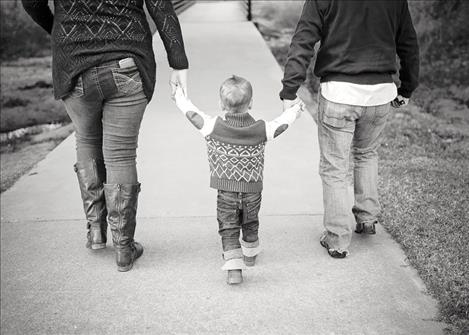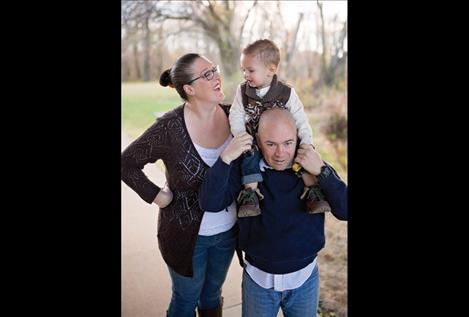Adoption option: Frozen 'snowflake' embryos offer new hope for families
Hey savvy news reader! Thanks for choosing local.
You are now reading
1 of 3 free articles.
Bree Fennell gave birth to her first baby at age 37. Shortly after, Bree and her husband, Jeff, wanted to grow their family, but after four or five months of trying, she couldn’t get pregnant. Their efforts were curtailed as Jeff, a staff sergeant with the U.S. Army, was deployed to South Korea for nine months. During his deployment, Bree began having hot flashes.
“I knew something was wrong,” she said. “A reproductive endocrinologist confirmed it. I was out of eggs.”
The new mom who spent years earning master’s degrees in music and psychology was diagnosed with Premature Ovarian Failure, sometimes called early-onset menopause, with less than a 1 percent chance of becoming pregnant.
“It was disappointing to us,” Jeff said. “We were really looking forward to having another one of our own. I kept praying and really holding out hope for a long time. I finally accepted the fact that it wasn’t going to happen.”
Determined to have a sibling for baby Solomon, Bree began researching traditional adoption, but the $30,000 to $50,000 price tag was prohibitive. Donor eggs, fertilized with Jeff’s sperm, would cost $25,000 for in-vitro fertilization, with a 32 percent chance of carrying the baby full term.
Through a support group on Facebook, Bree heard of a relatively new alternative — embryo adoption.
Families who have harvested the dad’s sperm and the mom’s eggs for IVF often have several fertilized eggs, called embryos, still frozen after their family is complete.
Parents’ options are to store the remaining frozen embryos for life, donate them to science, terminate them, or use the life-saving option of donation, Bree explained.
The embryos waiting to be adopted are nicknamed “snowflakes.” The snowflake options vary, but can cost the adoptive parents roughly $5,000 to $12,000 for testing, procedures, and medical care.
It’s estimated around 7,000 snowflake babies have been born in the U.S. since the first cryo-preserved, adopted embryo baby was born in 1998. There are between 600,000 to 1 million snowflakes awaiting adoption in the U.S., according to the National Embryo Donation Center.
“All these little potential lives being created and not utilized. What does God think about this? It’s weird when you bring spirituality into it,” Bree said.
With a 50-50 chance of her body delivering a healthy baby from the donated snowflake, and after copious hours discussing every aspect, the couple decided to go for it, although Jeff admits he was skeptical at first.
“This was not by any means an easy decision. It was the hardest, most thought-out decision Bree and I ever made. We talked about every possible scenario: pros, cons, everything,” Jeff said. “What it came to is: if we are good parents, this will work out.”
After finding a quality clinic, they chose to adopt anonymously, although some adoptive parents choose to have open relationships with the embryo’s donor family.
The Fennells were given 15 profiles to peruse that included the parents’ ethnicity, hair color, height, weight and college education, “all the information they could give us, short of telling us who they are,” Bree said.
One family was of African-American descent, another was from India. The rest were Caucasian. The Fennells ended up picking the profile that looked most like them. The donor family is from Irish, English and Scottish descent. The dad is 6 feet tall and the mom is 5’ 3’, — “one tall, one short, both brown hair. We kind of picked based on that,” Bree said.
From that family, the Fennells chose the last of 13 remaining embryos. Under a doctor’s supervision, Bree was put on a cycle of estrogen and progesterone, and then went through a series of tests to be certain her body was ready to conceive. On a screen in the clinic, Jeff watched as the embryo was inserted into her uterus.
“Seeing the embryo get planted … it’s an amazing journey,” Jeff said. “The embryo really looks like a tiny snowflake.”
According the science of epigenetics, which studies inheritable traits that cannot be explained, the adopted embryo can end up looking like the adoptive parent.
“My body can influence which genes express themselves,” Bree said
“That’s a really interesting part of this.”
The baby boy, now flourishing inside of her, is due May 3. The Fennells choose not to use the word “adopted” when describing their snowflake baby, “because he’s ours now,” Bree said.
There are still concerns to face in the future. Bree and Jeff agree they will be open and honest with their snowflake son, but still must decide how and when to tell him he was once frozen.
“How do we present this? It could make or break the whole experience,” Bree said. “Another thing you have to wrap your head around is: how many siblings are running around world? They might have a sibling from the same batch but the child could be 10 years older.”
Because of that, in the future their son will need to be DNA tested before getting married, she said.
Bree and Jeff are also prepared to connect their son with a DNA database if he eventually wants to find his donor parents.
There may be potential legal concerns as well. Both donor and recipient couples must acknowledge that the law of embryo donation and adoption is unresolved. In the U.S., embryos have a special legal status that is yet to be clearly defined, but are generally are considered property, not human beings. Because of this, different embryo adoption programs may differ in how they define embryos in their legal agreements. Embryos cannot be sold, only donated. Embryo owners transfer ownership by a legal contract that includes adoption, agreement and relinquishment forms. There are no federal or state laws specifically governing the adoption of embryos, although Georgia, Louisiana and Tennessee have passed legislation concerning aspects such as the right to finalize an adoption in court.
The Fennells, who live in Missouri but have family in Lake County, are confident they made the right decision.
“We really want to bring him into the fold,” Jeff said. “I want my sons to be super close, best friends, one great big family, so when Bree and I are long gone, they still have each other.”

















